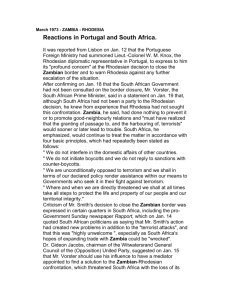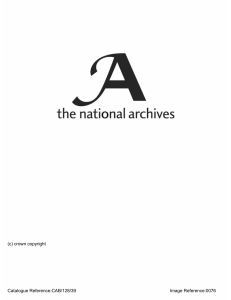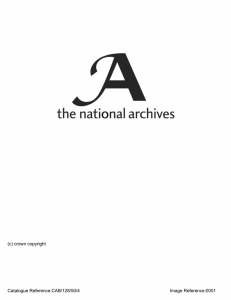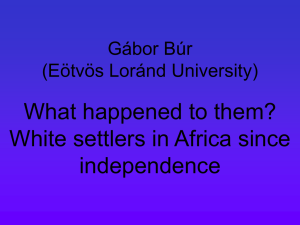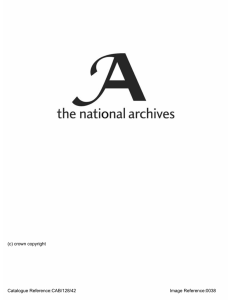(c) crown copyright Catalogue Reference:CAB/128/39 Image Reference:0072
advertisement
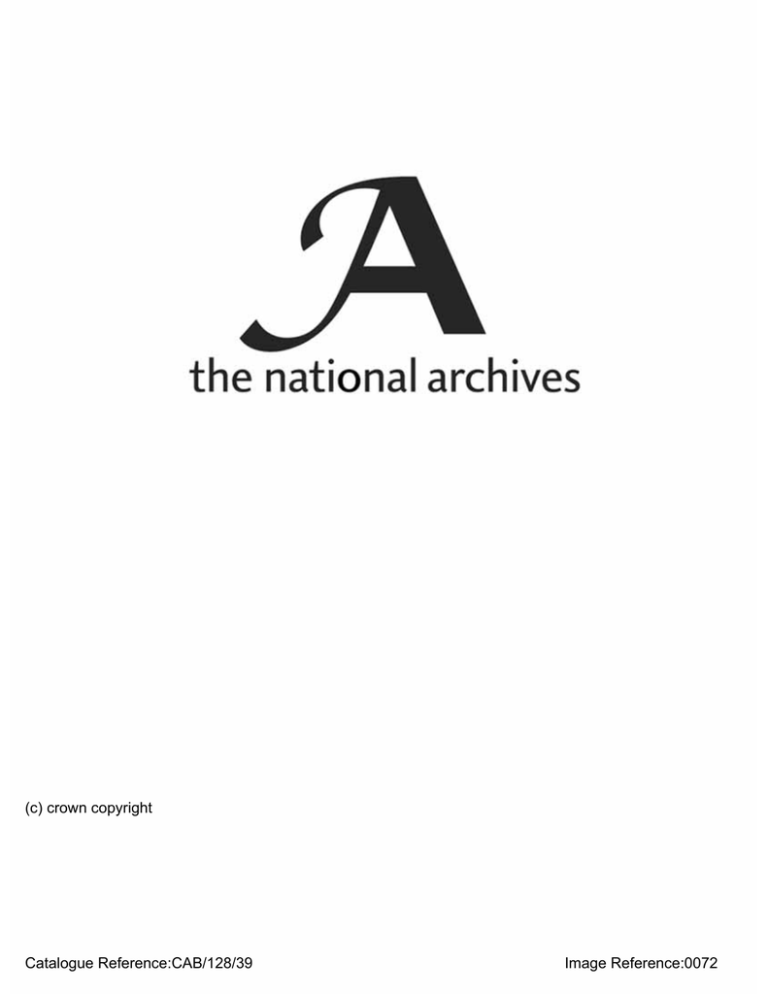
(c) crown copyright Catalogue Reference:CAB/128/39 Image Reference:0072 THIS HER DOCUMENT IS T H E PROPERTY BRITANNIC MAJESTY'S Printed for the Cabinet. OF GOVERNMENT November 1965 CC (65) 56th Conclusions Copy N o . CABINET CONCLUSIONS of a Meeting of the Cabinet held at 10 Downing Street, S.W.1, on Tuesday, 2nd November, 1965, at 10.30 am. Present: The Right Hon. HAROLD WILSON, M P, Prime Minister T h e Right H o n . GEORGE BROWN, M P , The Right Hon. HERBERT BOWDEN, M P, First Secretary of State and Secretary of State for Economic Affairs The Right Hon. LORD GARDINER, Lord President of the Council The Right Hon. JAMES CALLAGHAN, M P , Lord Chancellor Chancellor of the Exchequer T h e Right H o n . MICHAEL STEWART, M P, The Secretary of State for Foreign Affairs T h e Right H o n . Sir FRANK SOSKICE, Q c, The Right M P, Secretary of State for the Home Department The Right H o n . WILLIAM R O S S , M P, T H E EARL OF LONGFORD, Lord Privy Seal The Right Hon. Hon. ARTHUR BOTTOMLEY, The Right Hon. JAMES GRIFFITHS, M P , The M P, Secretary of State for the Colonies Hon. D E N I S HEALEY, M P , Secretary of State for Wales T h e Right H o n . ANTHONY GREENWOOD, Right Hon. M p, Secretary of State for Common­ wealth Relations Secretary of State for Scotland The Right Secretary of State for Defence RICHARD CROSSMAN, Right H o n . DOUGLAS JAY, MP, President of the Board of Trade The Right Hon. ANTHONY CROSLAND, M P. Secretary of State for Education and Science M p, Minister of Housing and Local Government The Right Hon. DOUGLAS HOUGHTON, T h e Right H o n . R. J . GUNTER, M P , The Right H o n . FRANK COUSINS, M P , Right Hon. FRED PEART, M P , Minister of Agriculture, Fisheries and Food The Right of the Duchy of Minister of Technology Minister of Labour The M p. Chancellor Lancaster Hon. T O M FRASER, M P , The Right H o n . FREDERICK L E E , M P , Minister of Power The Right Hon. BARBARA CASTLE, M P, Minister of Overseas Development Minister of Transport The following were also present: T h e Right H o n . Sir E L W Y N JONES, Q c, M p, Attorney-General The Right H o n . EDWARD SHORT, M P , Chief Secretary, Treasury Secretariat: Sir BURKE TREND Mr. P. ROGERS Mr. J . H . LOCKE 6706-3 CONTENTS Minute Subject No. 1 RHODESIA 2 S H I P P I N G INDUSTRY Fairfields Shipyard Page 3 7 Rhodesia (Previous Reference: CC(65) 55th Conclusions, Minute 2) 1. The Cabinet had before them a Note by the Prime Minister (C. (65) 142), to which were annexed: (a) The text of the statement which the Prime Minister had made in the House of Commons on the previous afternoon describing the outcome of his consultations with the Rhodesian Government during his visit to Salisbury in the previous week. (b) The text of a report by the Commonwealth Secretary and the Attorney-General about the result of further discussions which they had conducted with the Rhodesian Government since the Prime Minister^ return from Salisbury. (c) The text of a letter which the Prime Minister of Rhodesia, Mr. Ian Smith, had sent to London on the previous day. (d) The text of part of the discussions which the former Prime Minister and Commonwealth Secretary had held with Rhodesian Ministers in London in September 1964. The Prime Minister said that he had made it clear to Mr. Smith in Salisbury that, if he was prepared to reject the advice of his more extreme supporters, it was now possible for him to lead Rhodesia away from the concept of a unilateral declaration of independence towards more constitutional methods of procedure. This opportunity had been provided to him by the suggestion which we had made towards the end of the discussions in Salisbury, namely that a Royal Commission should now be established, on the joint recommendation of both Governments, in order to devise a means of ascertaining whether specified constitutional proposals were acceptable to the people of Rhodesia as a whole and so satisfying the fifth of our five principles. Mr. Smith had accepted this proposal in principle, together with our suggestions about the size and composition of the Royal Commission and our stipulation that their report should be unanimous. On the other hand there was as yet no agreement between the two Governments about the content of the proposals which should be submitted to the test of opinion in Rhodesia once the Royal Commission had devised a satisfactory means of conducting such a test. The Commonwealth Secretary and the Attorney-General confirmed that this was so. All the discussions which they had conducted with the Rhodesian Government after the departure of the Prime Minister from Salisbury had revealed that a fundamental difference still persisted between the two Governments about the safeguards which should be incorporated in any proposals to be canvassed by the Royal Commission in order to prevent retrogressive amendment of the constitution after independence. In particular, it was clear that the Rhodesian Government were determined to retain their freedom to prevent the ultimate emergence of African majority rule in Rhodesia by refusing to entrench the clauses in the constitution which governed the composition of the Legislature and so leaving themselves free to adjust the ratio of " A " Roll to " B " Roll seats in such a way as to perpetuate a European majority. They contemplated the elimination of a " B " Roll seat in return for each 6706-3 " A " Roll seat which was won by an African as the Africans acquired, over a period of years, the higher educational and economic qualifications which the " A " Roll franchise required; and they had rejected even our modest suggestion that one African " B " Roll seat should not be surrendered until at least two " A " Roll seats were occupied by Africans. Moreover, although they were prepared to try to enlarge African educational opportunities, they had made it wholly clear that their motive in so doing was merely to equip the Africans to participate more effectively in the economic life of the country and not in any way to hasten their political advancement. The Prime Minister said that the Cabinet were faced with a very difficult decision. His discussions in Salisbury had made it very clear that Rhodesia was not yet ready for independence. The African Chiefs, on whom the Rhodesian Government relied for support of their own views, were politically immature. The African Nationalists were divided between two factions, who showed little inclination to co-operate or to adopt constitutional methods, although he had some success in compelling them to realise the realities of the situation in Rhodesia and the impracticability of United Kingdom intervention by means of military force. European opinion in the country was divided between the extremist Rhodesia Front, which constituted the Government, and more moderate individuals such as the Chief Justice, Sir Robert Tredgold, Mr. Garfield Todd, Sir Roy Welensky, etc., all of whom had been shown by his discussions with them to be opposed to a unilateral declaration of independence but, for a variety of reasons, to be incapable in present circumstances of providing an effective focus of opposition to Mr. Smith's Government. African opinion outside Rhodesia was similarly divided. On his return journey he had discussed the situation with the President of Zambia, President Kaunda, who had been very apprehensive of the possible impact of a unilateral declaration of independence on the Zambian economy but had agreed with other African leaders in condemning the attitude of Mr. Smith's Government. The Prime Minister of Nigeria had also adopted a moderate tone and had been prepared to give public support to our proposal for a Royal Commission. The President of Ghana had attacked it in a public statement but had shown himself, in private discussion, to be well disposed towards our efforts of conciliation. The East African leaders, in their discussions with the Commonwealth Secretary and the Attorney-General on their way home from Salisbury, had shown a similar diversity of attitude. President Nyerere of Tanzania had maintained that there should be no question of independence for Rhodesia until majority rule had been established, no matter how long this process might take. President Obote of Uganda had continued to insist that, in the last resort, the United Kingdom should be prepared to intervene with military force. On the other hand the Prime Minister of Malawi. Dr. Banda, had welcomed the proposed Royal Commission; and President Kenyatta of Kenya had indicated that, provided the Royal Commission played a genuinely constructive role and was not regarded as a mere device for gaining time, he would be prepared to try to influence the African Nationalists to co-operate with it in its work. In these circumstances, four courses of action appeared to be open to the Cabinet: (i) We could accept the suggestion made in Mr. Smiths latest letter that the proposal to be canvassed by the Royal Commission should be the Rhodesian Governments own proposal that Rhodesia should proceed to independence on the basis of the 1961 Constitution, with no more than the minimum of formal amendment required to eliminate the last remnants of United Kingdom control. This would be on the understanding that we would accept whatever result emerged from the procedure whereby this proposal would be put to the test of Rhodesian opinion. (ii) We could proceed as in the first course, while making it clear that, so far from acquiescing in the Rhodesian Governments proposal, we openly opposed it. (iii) We could suggest that Rhodesian opinion should be given an opportunity to choose between the Rhodesian Governments proposal and our own proposal for an independence constitution which would be more liberal in its character and would contain more effective safeguards against retrogressive amendment. There were certain precedents for providing an option of this kind in constitutional referenda, not least the precedent of Rhodesia itself in 1923, when the population were allowed to indicate whether they preferred to unite with South Africa or to remain associated with the United Kingdom. (iv) We could refuse to make any further concession to the Rhodesian Government and could insist that the only proposal to be submitted to the test of Rhodesian public opinion should be a proposal for the type of constitution which we ourselves favoured. We could indicate that, if this suggestion were rejected, we would no longer support the proposal for a Royal Commission. The merit of the first and second courses was that they might postpone a unilateral declaration of independence for a few more months. The third and fourth would be more likely to provoke the Rhodesian Government into taking early action of this kind; but they would have the advantage that we should be more clearly seen to be adhering to our five principles. In discussion it was suggested that a fifth course might lie in submitting the Rhodesian Governments own proposal to the test of a referendum as distinct from some procedure devised by the Royal Commission. This would certainly be unacceptable to the Rhodesian Government; but it was the one course which it was known that the African Nationalist leaders would accept. If, therefore, our objective was to take Mr. Smith at his word by showing willingness to test the acceptability of the 1961 Constitution without sacrificing our principles and the support of African opinion, this was probably the safest course which we could pursue. On the other hand there would be very great difficulty in ensuring that a referendum would be satisfactorily conducted in a country whose methods were now. largely those of a police state. Nor could we afford to appear to abandon the concept of a Royal Commission so soon after we had actively promoted it ourselves. For these reasons the effective choice appeared to lie between the second and third of the courses suggested by the Prime Minister. In favour of the third it could be urged that, so far as it was possible to predict the reactions of the Rhodesian Government, they would probably reject whatever suggestions we made, since they had almost certainly taken the decision to assume their independence unilaterally and were merely seeking the most favourable occasion to do so. If so, it was essential that we should not appear to have sacrificed our principles merely in order to avoid a unilateral declaration of independence; and we should be better placed to demonstrate this to world opinion if we insisted from the outset that the proposals to be canvassed by the Royal Commission should include our own proposal for a new and more liberal constitution as well as the Rhodesian Governments proposal for the mere continuance of the 1961 constitution. On the other hand it remained essential to avoid, if possible, a unilateral declaration of independence, having regard to the incalculable damage which it might cause, not least to the economies of the United Kingdom and Zambia, if a state of economic warfare developed between Rhodesia and Zambia and supplies of Zambian copper to the United Kingdom were interrupted. Moreover, there were grounds for questioning whether the economic measures which we had it in mind to take in the event of a unilateral declaration of independence would, in fact, prove to be effective; and every week which passed without such a declaration made it the less likely that the Rhodesian Government could maintain the state of political unity and psychological tension which it presupposed. Finally, it was open to question whether we should be wise to commit ourselves to inviting the Royal Commission to canvass our own proposal, since the constitution which it implied, though far more liberal than the Rhodesian Governments proposal, would not be likely to be acceptable to those sections of African opinion which would be content with nothing less than African majority rule as a prior condition of independence. For these reasons it might be preferable to adopt the second course, provided that we publicly dissociated ourselves from the Rhodesian Governments proposal and that this was made clear by the Royal Commission in the course of their canvassing of public opinion in Rhodesia. Admittedly, this course involved the risk that, if the proposal were shown to be acceptable to the people of Rhodesia as a whole—as was not impossible, if the African members of the population boycotted the Royal Commission procedure—we might then be morally bound to recommend to the House of Commons that independence should be granted to Rhodesia on terms which we ourselves should have condemned in advance. On the other hand this risk should be negligible in practice, particularly if the Africans realised that we ourselves rejected the proposal which they would be being invited to endorse. Moreover, the findings of the Royal Commission should not be mandatory; and, although they would obviously carry great weight, we could not be expected to commit ourselves in advance to implement them by legislation, regardless of CC 56 (65) their nature. The Rhodesian Government would themselves confront the same dilemma, if their proposal were shown to be unacceptable to the people of Rhodesia as a whole and we required them in advance to accept the consequences. The Prime Minister, summing up the discussion, said that the balance of opinion in the Cabinet appeared to be in favour of the second course, although we should not count on its proving acceptable to the Rhodesian Government. In reply to the latest letter from Mr. Smith, therefore, we should agree that the Rhodesian Governmenfs own proposal should now be put to the test of acceptability to the people of Rhodesia as a whole, provided that we publicly dissociated ourselves from it and insisted that this fact should be made clear by the Royal Commission; that the Royal Commission, before canvassing it with Rhodesian opinion, should submit, for approval by both Governments, a unanimous report on the methods by which they proposed to conduct this canvass; that, if their suggestions for this purpose were approved, they should themselves supervise whatever procedures were adopted in order to implement their findings; that we should refuse to commit ourselves in advance to accept without qualification the result of the canvass; and that, if the Rhodesian Governmenfs proposal was shown to be unacceptable to the people of Rhodesia as a whole, we should be free either to revive our original conception of a Royal Commission as a means of devising a new constitution for Rhodesia or to remit the issue to a constitutional conference, of course which would have the unanimous support of African opinion. At the same time, we should inform the Rhodesian Government that, if they were unwilling to accept these suggestions, we would be prepared to agree that their proposal should be submitted to the test of a referendum of the whole of the adult population of Rhodesia, provided that it was conducted on the basis of uninhibited political activity by all sections of the community, was subject to adequate impartial supervision and incorporated stringent safeguards against intimidation. He would propose to make an announcement to this effect in the House of Commons on the following day, shortly after our reply to Mr. SmiUYs letter had been delivered in Salisbury. It would be helpful if he could announce at the same time the name of the United Kingdom representative on the Royal Commission. The C a b i n e t Agreed that the reply to the latest letter from the Prime Minister of Rhodesia, Mr. Ian Smith, should be on the lines indicated in the Prime Minister^ summing up of their discussion. Shipping Industry Fairfields Shipyard 2. The Chancellor of the Exchequer said that a difficult situation had arisen at the shipbuilding yard of the Fairfields Engineering and Shipping Company. This was a modernised yard on the Clyde which employed some 3,500 men and had got into financial difficulties. T h e Receiver had informed him that money could not be obtained to continue the day-to-day operations of the yard after the present week and it would have then have to close down unless Government assistance were forthcoming. The Bank of Scotland was the main creditor, with a first charge on loans amounting to £4 million which were unlikely to be settled in full on liquidation. Although the men employed would probably find other jobs on the Clyde if the yard were closed down, its closure would be a profound psychological shock for the shipbuilding industry. Moreover, the Report of the Geddes Committee of Enquiry on Shipbuilding was due in January and might make proposals for rationalising the shipbuilding yards on the Clyde as well as in other areas. Mr. Geddes had informed him that his Committee would not feel able to present an interim report relating to the yard but might feel able to refer specifically to it in his eventual report. There was, therefore, a case for considering whether the Government should take steps to see that the yard was able to carry on until the Geddes Report could be considered. This could be done by asking the Bank of England to advance money, with a guarantee from the Government under the Borrowing (Control and Guarantee) Act of 1946. But to keep the yard going for several months might require up to £1 million and it was probable that little, if any of this money would be recovered. Moreover a permanent reconstruction of the company's finances would probably require £3-£4 million of additional equity capital. The difficulties of the yard sprang from bad management and from accepting contracts for ships which could only be fulfilled at a loss. H e had not yet formed a view on whether the Government should keep the firm going until the Geddes Report was available but it would be desirable for a group of Ministers to meet under his chairmanship to consider this. The group might consist of the First Secretary of State, the Secretary of State for Scotland, the President of the Board of Trade, the Minister of Labour and the Minister of Technology. In discussion there was general agreement that Ministers should consider whether Government assistance, either through the Bank of England, or possibly through the Board of Trade Advisory Committee, should be given to the firm for a short period until the future of the shipbuilding industry could be seen more clearly. When the Geddes Report was received it might be desirable to consider whether the yard should be taken over by the Government but it would be premature to do so now. The C a b i n e t Invited the Chancellor of the Exchequer to convene a meeting with the First Secretary of State, the Secretary of State for Scotland, the President of the Board of Trade, the Minister of Labour and the Minister of Technology to consider whether short-term Government assistance should be given to keep the Fairfields yard i n operation for the time being. S.W.1, Cabinet Office, 2nd November, 1965,
